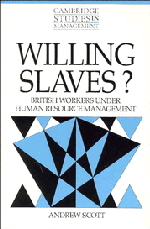Summary
Introduction
Companies which have publicised their ‘new industrial relations’ have often captured a good deal of attention in recent years. Enthusiastic accounts of new developments have often portrayed previous methods of working as old-fashioned and uncompetitive. Some advocates of the ‘new industrial relations’ have implied that the spread of new approaches will be inevitable and universal on account of their potential for improved efficiency, achieved both through a reduction in supervisory overheads and the liberation of workers' individual talents. Yet in the search for something new, commentators have perhaps been too ready to set aside the lessons and ideas of the past. The biscuit works which is the subject of this chapter provides an opportunity to examine the extent and means by which a decidedly orthodox approach to industrial relations can be reconciled with modern competitive pressures.
One might suppose that even in corporations where high levels of trust have been established for many years, changing external circumstances have placed harmful stress upon long-established relationships and practices (Fox 1974 p.307). For this reason it is interesting to examine what degree of co-operation is nowadays sustainable within traditional approaches. As many companies have increasingly preferred to appeal to workers directly, without the involvement of trades unions, the biscuit works provides an opportunity to review whether consultation with worker representatives and careful adherence to formal agreements can bring forth the co-operation and flexibility necessary for competitive production.
- Type
- Chapter
- Information
- Willing Slaves?British Workers under Human Resource Management, pp. 71 - 96Publisher: Cambridge University PressPrint publication year: 1994



